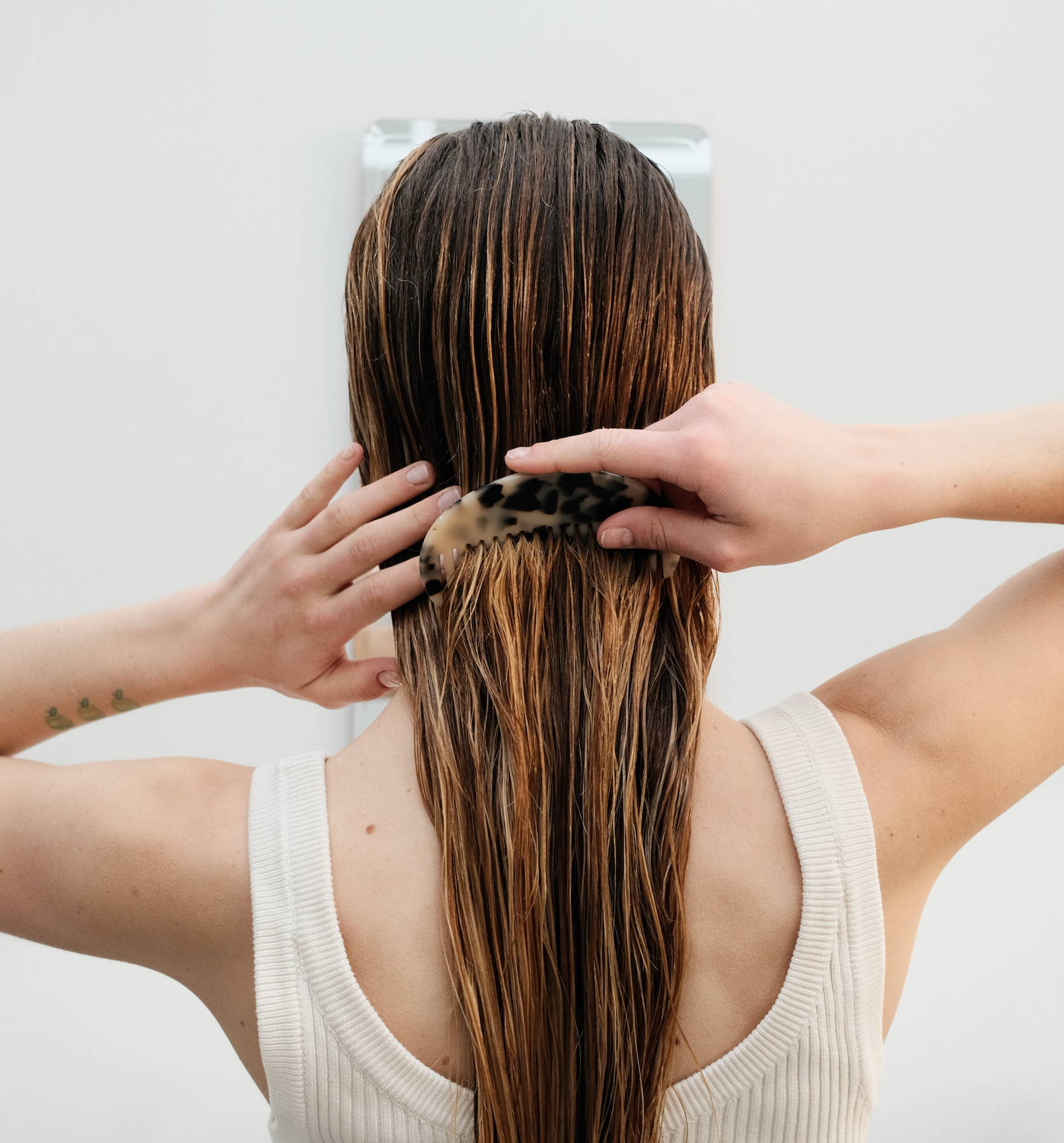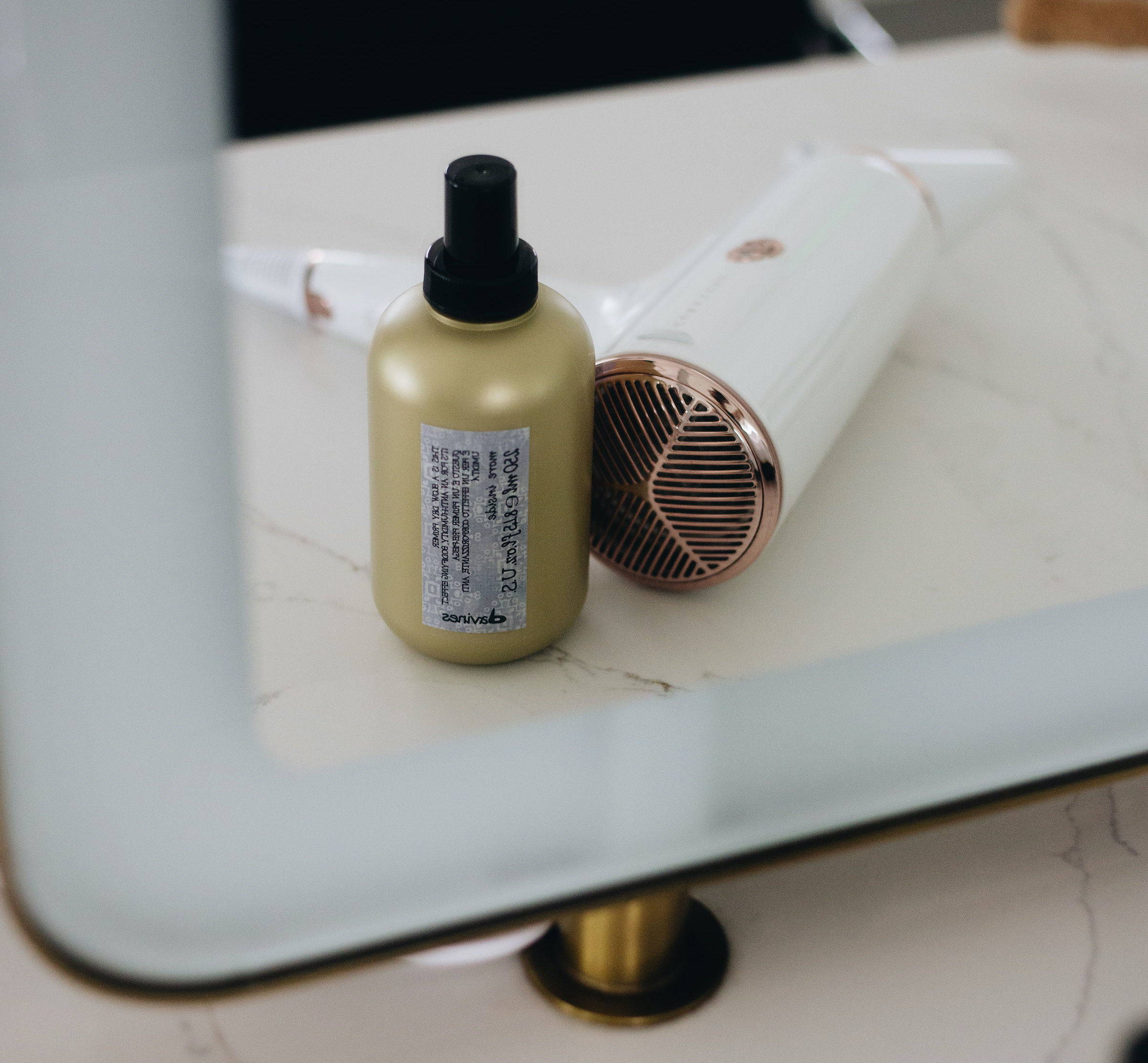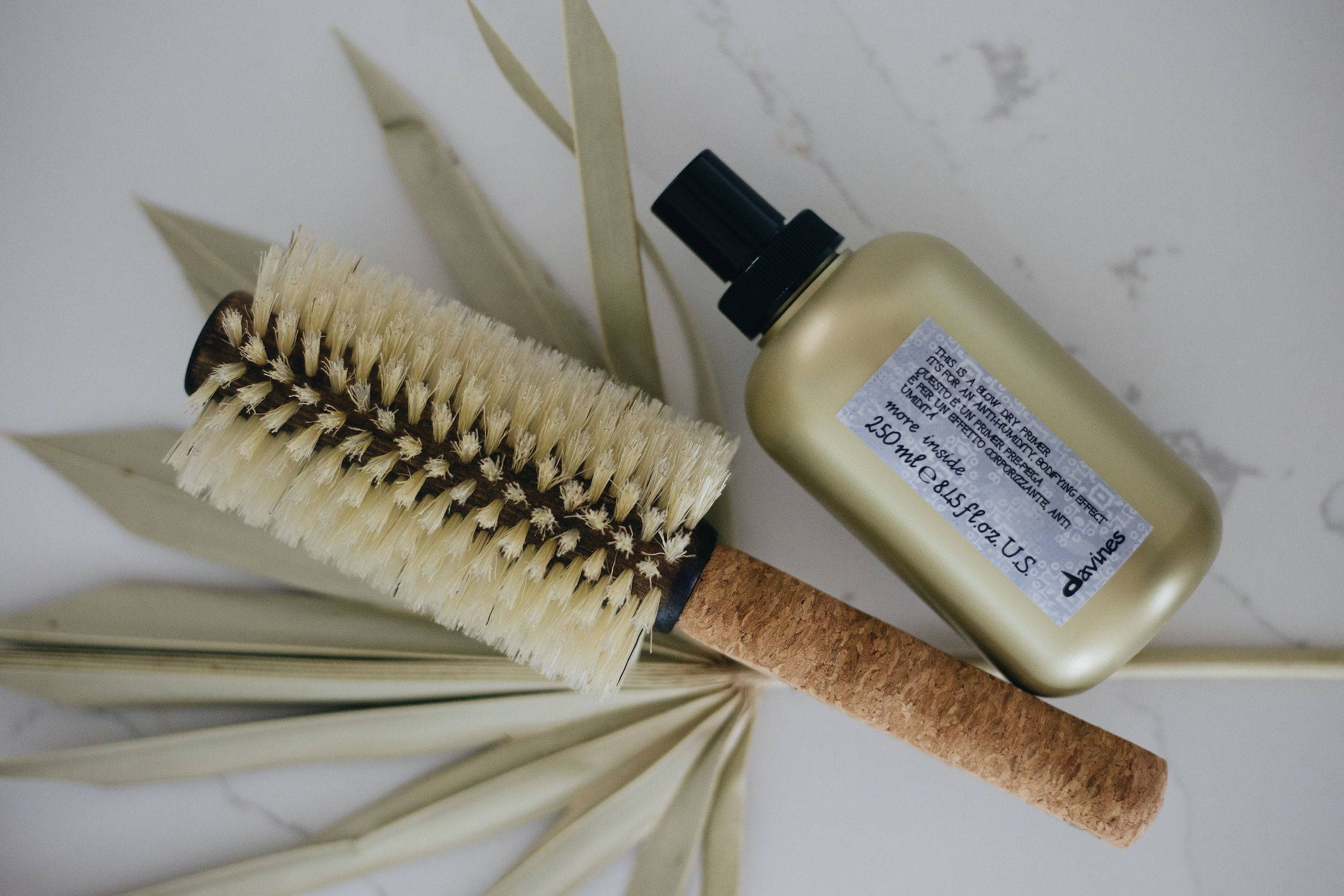Free Carbon Neutral Shipping On Orders $75+, Plus Free Samples!
Buy Now and Pay Later in 4-interest free installments with Klarna
The perfect blowout is no easy feat but with the right tools, styling products and a little practice, you can master a salon quality blowout at home. If you’re wondering how to blow-dry your hair straight, you’ve come to the right place. Because we’re breaking down the best tips and tricks for blow-drying your hair straight like a pro.
Blow-drying sopping wet hair not only takes forever, but it also encourages frizz. If you’ve been asking yourself "Why does my hair look frizzy after I blow-dry it?" ...this is probably why! Starting with soaking wet hair leaves it parched and brittle. Most of the heat damage associated with blow-drying comes about because people do it for too long. Towel drying reduces the time frame of the actual blow-dry, so you’re less likely to end up with dried-out frizzy hair. But be careful not to vigorously rub your hair with a towel, as this creates friction between the towel and your hair causing cuticles to break. Instead, use a microfiber towel to squeeze out excess water toward the ends, and pat dry.
Hair takes shape when it's ranging from damp to dry, NOT wet to damp — so don’t waste time and effort here. Instead, rough dry using your fingers. Prep your wet hair with a heat protectant and your favorite straight hair styling product, then roughly dry it in until your hair is nearly completely dry. Don’t be too precise with your rough dry, and don’t aim the nozzle down at this point. Focus on the roots and blow dry upwards. Keep your hairdryer moving the whole time with a rough dry; concentrating for too long on one area will cause heat damage, and you’re not aiming for styling at this point. Do this until your hair is about 50% dry if it’s curly or wavy, or 80-90% dry if it’s straight.

One of the biggest mistakes people make with an at-home blowout is that their sections are too large — too much hair on your hairbrush can result in flat hair or frizz. Additionally, using sections that are too large can make it difficult to concentrate your brush, leading to breakage. For smooth management, divide your hair into small sections around 1-2 inches in width. Divide your hair into four sections by creating a horseshoe shape from your temples to the back of your crown, and then parting it down the middle. Clip up the sections and then work on one quadrant at a time.
Tension is key when it comes to perfecting a long-lasting blowout. It’s essential for getting hair to dry smoothly, especially if you have cowlicks. Always use a nozzle to centralize air over the bristles of your brush around five inches away from taut sections of hair, and pointed down to minimize flyaways. Dry slowly in small sections from root to ends going slow in order to seal the cuticle.
When you’re done drying each section, give a quick all-over blast with cool air to set the blowout. Once you're finished and your hair is cool, lightly rake through with your fingers. Turn your head upside down, shake it out a bit and flip it back. Mist with your favorite shiny hair products, and once your look is finished, keep your hands out of it.
Choose a brush based on the results you’re looking for and your hair type. The most common hair brushes include:

If you blow-dry your hair daily — and yes, you can blow-dry your hair every day — it’s best to invest in a high quality hair dryer that offers functions to minimize hair damage and help cut down your drying time. A good dryer offers multiple heat settings, a cool shot to close hair cuticles, and ionic air technology. And there are plenty of affordable stylist-recommended options, if you don’t want to spend a lot of money.
Always prep your hair with the appropriate styling products throughout your hair, and apply them evenly. Use heat protectants, smoothing serum for frizzy hair or texturizing liquid for volume, all while wet, parting your hair, creating sections, and working products from mid-shaft to ends using your fingers or a comb. This disperses them evenly throughout.
The flat nozzle piece that comes with the blow dryer provides direct concentrated heat to your strands, making your damaged hair smooth and shiny. Always point the nozzle down along the hair shaft to allow the cuticle to close and to create a glossy effect. For a messier, textured look, finish with a blast from underneath.
Though you may think it gets the job done quicker (and it may) blow-drying your hair on the hottest setting is not good for your hair. It’s best to adjust your blow-dryer’s heat setting and airflow setting depending on your hair type. For fine or thin hair, a low to medium heat and airflow setting is ideal. Thicker hair can withstand a bit more heat and a lower airflow setting. And no matter what heat setting you use, be sure to finish off with a blast of cool air to add shine.
A straight blow out requires tension in the strands. If the brush bristles are too far apart for your hair type, the shaft will bounce back to its original form and you'll end up drying it in place as is. A round brush creates a lot of tension for your hair strands, which can cause damage if your hair is wet. Many round brushes also have metal cores that heat up from the blow dryer and can cause even more damage. For the smoothest results, use a brush with a lot of surface area. A big brush will give your hair room to dry while still brushing sections out smoothly. Opt for a traditional boar bristle brush or a nylon bristle brush.

At the very least, you should be prepping your strands with a heat protectant before blow-drying. One of the biggest culprits of hair damage is a lack of heat protection. Our heat protection products have heat protective properties to keep your hair healthy and strong. In addition add a volumizing mousse or a blow-dry primer. If you have thick hair, work styling products into sections. If you have thin hair, apply products halfway down through the ends to avoid greasy-looking strands.
If you have thinning hair, daily blow drying can be drying. To minimize damage, look for a blow-dryer with ionic technology. Work a heat protection spray and volumizing mousse into your hair, then flip your head upside down and direct the air at your roots. This will create lots of volume, disguising any hair loss.
If you have thin hair, avoid styling products with ingredients like polymers, ammonia, and detergents. These can strip the scalp and hair of their much-needed natural oils. Hair that’s already thinning can look especially stringy after using them.
The reason for working from root to tip when blow drying is because this is the direction of your hair growth. Working against it opens the cuticles of the hair shaft, encouraging tangles and frizz. Always blow dry from root to end to fuse the cuticles, and add shine to your hair strands.
Blow-drying your hair straight takes patience. Moving too fast can cut a blowout's life short. Allowing your hair to cool on the brush a bit before moving on to the next section, allows it to set, making all your hard work last longer. Taking your time will keep your smooth, shiny blowout fresh for up to two days. Keep a dry shampoo on hand to stretch it even longer.
The last thing to keep in mind is that blow-drying your hair straight like a pro starts in the shower. This means choosing a shampoo and conditioner formulated to address your hair type and concerns. All of our Davines shampoos and conditioners are free of harmful toxins and made from natural ingredients. Our products are made with renewable energy and packaging that minimizes the environmental impact. Our hair care isn’t just good for your hair, it’s good for the planet.
by Jaclyn LaBadia, featured contributor
Laisser un commentaire
Les commentaires sont approuvés avant leur publication.